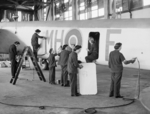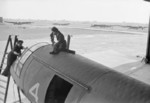A.W.38 Whitley
| Country | United Kingdom |
| Manufacturer | Armstrong Whitworth Aircraft |
| Primary Role | Medium Bomber |
| Maiden Flight | 17 March 1936 |
Contributor: C. Peter Chen
ww2dbaseThe A.W.38 Whitley medium bombers were designed by John Lloyd of Armstrong Whitworth Aircraft in response of Air Ministry Specification B.3/34 for a heavy night bomber. 207 of these mid-wing, twin-engined bombers entered service with seven squadrons between 1937 and the start of the European War and saw action (dropped leaflets over Germany) on the very first night that Britain declared war on Germany. They also participated on the very first bombing missions on Germany on the night of 19 Mar 1940 and on Italy in Jun 1940. Unlike their contemporaries that were used heavily in daylight raids, A.W.38 bombers were used mostly at night, therefore the casualty rate was relatively low for these bombers. After flying 8,996 missions and dropping 9,845 tons of bombs, they were made obsolete in late 1942, though they remained in service as transports until the end of the war. 269 aircraft were lost in action. During the model's lifetime, 1,737 were built.
ww2dbaseSource: Wikipedia.
Last Major Revision: Apr 2007
A.W.38 Whitley Timeline
| 17 Mar 1936 | The Armstrong Whitworth Whitley all-metal twin-engine monoplane bomber made its maiden flight. |
| 9 Mar 1937 | The Armstrong Whitwotrth Whitley Mk I heavy bomber joined No. 10 Squadron RAF and went on to equip no fewer than 20 RAF Squadrons. |
SPECIFICATIONS
Mk. V
| Machinery | Two Rolls-Royce Merlin X liquid-cooled V12 engines rated at 1,145hp each |
| Armament | 1x7.7mm forward Vickers machine gun, 4x7.7mm rear Browning machine guns, up to 3,200kg of bombs |
| Crew | 5 |
| Span | 25.60 m |
| Length | 21.49 m |
| Height | 4.57 m |
| Wing Area | 106.00 m² |
| Weight, Empty | 8,768 kg |
| Weight, Maximum | 15,196 kg |
| Speed, Maximum | 370 km/h |
| Rate of Climb | 4.10 m/s |
| Service Ceiling | 7,900 m |
| Range, Normal | 2,650 km |
| Range, Maximum | 3,900 km |
Photographs
 |  |  |  |
Please consider supporting us on Patreon. Even $1 per month will go a long way! Thank you. Please help us spread the word: Stay updated with WW2DB: |

- » Wreck of Teruzuki Found (27 Jul 2025)
- » USS Orlean's Bow Found (22 Jul 2025)
- » The Emperor of Japan Planned to Honor WW2-era Japanese POWs in Mongolia (4 Jul 2025)
- » US State Lawmaker John Winter Caught Using Racial Slur "Jap" and Apologized (11 Jun 2025)
- » US Government Plans to Purge WW2 Information (17 Mar 2025)
- » See all news
- » 1,182 biographies
- » 337 events
- » 45,119 timeline entries
- » 1,249 ships
- » 350 aircraft models
- » 207 vehicle models
- » 376 weapon models
- » 123 historical documents
- » 261 facilities
- » 470 book reviews
- » 28,415 photos
- » 365 maps
Joachim von Ribbentrop, German Foreign Minister, Aug 1939
Please consider supporting us on Patreon. Even $1 a month will go a long way. Thank you!
Or, please support us by purchasing some WW2DB merchandise at TeeSpring, Thank you!